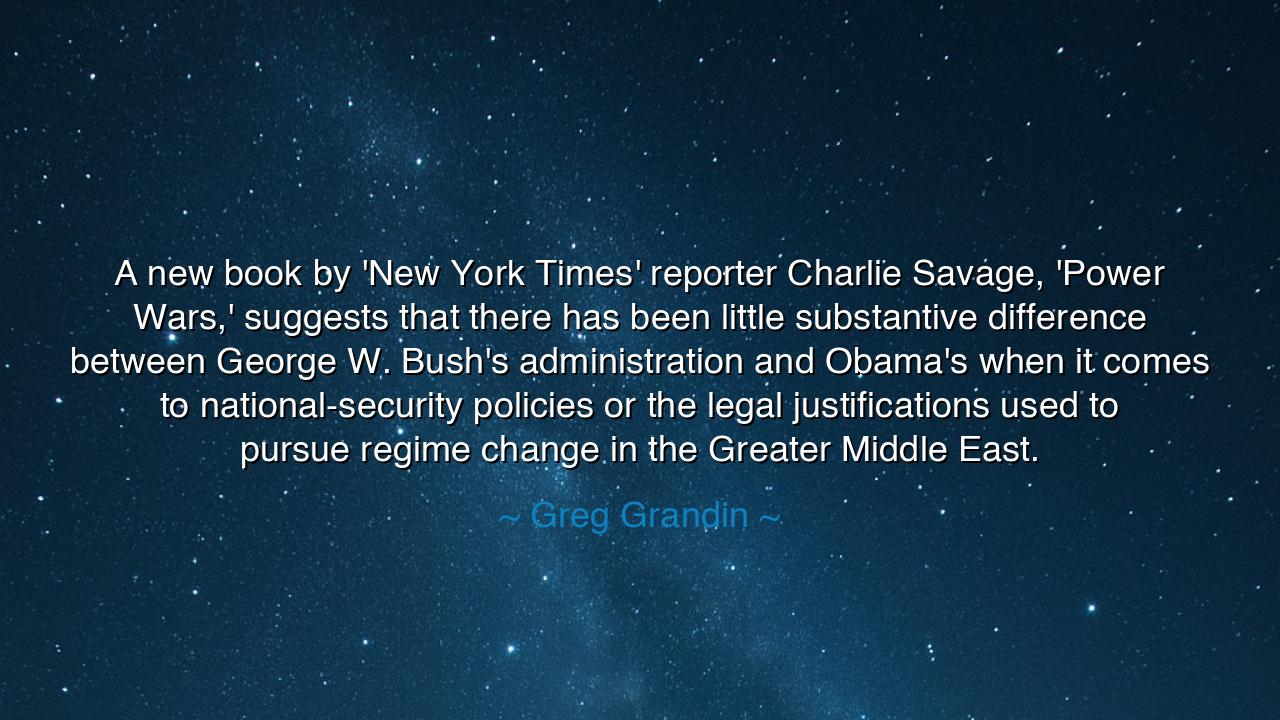
A new book by 'New York Times' reporter Charlie Savage, 'Power
A new book by 'New York Times' reporter Charlie Savage, 'Power Wars,' suggests that there has been little substantive difference between George W. Bush's administration and Obama's when it comes to national-security policies or the legal justifications used to pursue regime change in the Greater Middle East.






The words of Greg Grandin, reflecting on the work of journalist Charlie Savage, strike with the solemn weight of revelation: “A new book by ‘New York Times’ reporter Charlie Savage, ‘Power Wars,’ suggests that there has been little substantive difference between George W. Bush’s administration and Obama’s when it comes to national-security policies or the legal justifications used to pursue regime change in the Greater Middle East.” Here lies a truth that many resist: that even as leaders change, even as rhetoric shifts and banners of ideology are waved, the machinery of power and war often grinds on with relentless continuity.
At the heart of the quote lies a piercing recognition: though Bush and Obama spoke with different tongues, their hands wielded similar tools. The same national-security policies, the same reliance on secret justifications, the same pursuit of regime change marked both eras. Grandin draws upon Savage’s work to unveil the uncomfortable reality that promises of transformation can be swallowed by the inertia of empires. For the Greater Middle East has long been a crucible where American power, clothed in shifting languages of freedom or security, has pursued the same goals by similar means.
History offers us countless examples of this pattern, where the faces of rulers change, but the logic of empire endures. Consider the Roman Republic as it transformed into the Roman Empire. Leaders who promised restraint often continued the same campaigns of conquest. Augustus, who presented himself as a restorer of peace, in truth carried forward the same imperial expansion as Julius Caesar. In the same way, Grandin points to how Bush’s “War on Terror” and Obama’s drone wars, though cloaked in different justifications, were joined by a common root: the relentless drive of empire to shape the world beyond its borders.
The legal justifications mentioned are especially crucial. For when wars are fought not openly but under the guise of legality, power cloaks itself in the garments of righteousness. Documents, doctrines, and interpretations of law become shields for actions that otherwise might be seen as violations of justice. This is not new. Kings of old invoked divine mandate, emperors claimed destiny, and modern nations claim legality. But as Grandin warns through Savage’s account, such justifications often serve not truth, but continuity—ensuring that the war machinery rolls forward regardless of who sits in the highest seat of power.
The danger of this continuity is profound. For when people believe that elections and leaders will bring dramatic change, yet the policies of security and war remain the same, disillusionment spreads. Citizens lose faith in the promise of democracy, thinking that their voices matter little against the entrenched structures of military and economic power. This cynicism erodes not only politics, but the spirit of a nation. Just as Rome fell into apathy when the Senate lost its meaning, so too do modern peoples risk despair when they see that their rulers, though different in speech, are alike in action.
Yet Grandin’s words also call us to vigilance. They remind us that it is not enough to judge leaders by rhetoric or party, but by the continuity of structures that endure behind them. The lesson is clear: true change cannot come merely from electing new leaders; it must come from challenging the deep systems of law, policy, and power that bind them all. Only then can the promises of transformation be more than echoes lost in the chambers of empire.
Therefore, children of tomorrow, learn from these words. Do not be lulled into thinking that the changing of one leader for another is the same as the changing of a path. Look deeper—at the policies, the laws, the justifications—and hold all who wield power to account. Remember the old truth: that empires fall not only from the might of their enemies, but from the blindness of their own people. Keep your eyes open, your voices strong, and your hearts committed to justice, lest the cycles of power continue unbroken, and the promise of renewal be forever delayed.






AAdministratorAdministrator
Welcome, honored guests. Please leave a comment, we will respond soon